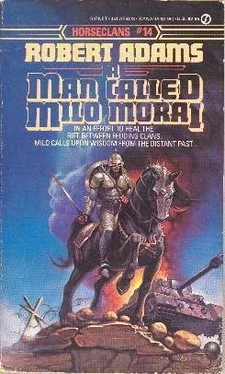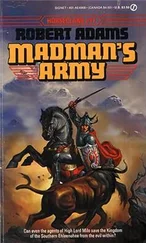Robert Adams - A Man Called Milo Morai
Здесь есть возможность читать онлайн «Robert Adams - A Man Called Milo Morai» весь текст электронной книги совершенно бесплатно (целиком полную версию без сокращений). В некоторых случаях можно слушать аудио, скачать через торрент в формате fb2 и присутствует краткое содержание. Жанр: Фантастика и фэнтези, на английском языке. Описание произведения, (предисловие) а так же отзывы посетителей доступны на портале библиотеки ЛибКат.
- Название:A Man Called Milo Morai
- Автор:
- Жанр:
- Год:неизвестен
- ISBN:нет данных
- Рейтинг книги:3 / 5. Голосов: 1
-
Избранное:Добавить в избранное
- Отзывы:
-
Ваша оценка:
- 60
- 1
- 2
- 3
- 4
- 5
A Man Called Milo Morai: краткое содержание, описание и аннотация
Предлагаем к чтению аннотацию, описание, краткое содержание или предисловие (зависит от того, что написал сам автор книги «A Man Called Milo Morai»). Если вы не нашли необходимую информацию о книге — напишите в комментариях, мы постараемся отыскать её.
A Man Called Milo Morai — читать онлайн бесплатно полную книгу (весь текст) целиком
Ниже представлен текст книги, разбитый по страницам. Система сохранения места последней прочитанной страницы, позволяет с удобством читать онлайн бесплатно книгу «A Man Called Milo Morai», без необходимости каждый раз заново искать на чём Вы остановились. Поставьте закладку, и сможете в любой момент перейти на страницу, на которой закончили чтение.
Интервал:
Закладка:
But Lewis answered first. “Means just what it means, Milo. You and Jethro is gentlemen, no two ways about it. You should rightly oughta be off sers … prob’ly will be, too, afore long, when thishere shootin’ war that’s comin’ sure as God made us all gets around to gettin’ the U.S. of A. mixed up in it.”
But their host demurred, saying, “Milo, yes, he’ll make a splendid officer, but not me, James. If offered a commission, I’ll have to refuse it. I prefer the basic anonymity of the other ranks; also, it is a part of my penance.
“I know you all wonder about me, who I really am, why I am here among you, but being true friends you never have been so rude, so crude as to ask, nor would I have told you had you done so. All that I will tell you is this: When I was far younger and foolish and full with the arrogance and selfishness of being born to wealth and position, I did a terrible, monstrously evil thing, and worse, I did it carelessly, without so much as a thought for whom my act might hurt and how much it would hurt them.
“I was protected, of course, from my due punishment by the power and influence and wealth of my family. Nonetheless, it was considered in the best interests of all and sundry that I leave the country for a bit. I left for Europe with a letter which allowed me to draw any amount I might need out of family accounts in certain Swiss banks. I never have returned to my home. My father and mother are long dead, as too are all of the other principals in the tragedy I brought about so long ago, yet still I am not free to resume the life I inherited, the position I degraded.
“I am a self-exiled man, and I shall continue to pay the price for my misdeed for as long as God gives me to live.”
Then, in a soaring tenor voice, Stiles sang Kipling’s “Gentleman Rjankers” to them.
Milo was long in forgetting that evening.
The training cycles came and went, commenced and ended, grinding out replacement personnel to meet the meager requirements of the small standing army which was all that the Land of the Free felt that it needed to remain tha|: way, with the “war to end war” now more than two decades in the past.
Kept penurious by a depressed economy and an anti-military, tight-fisted Congress, they trained and drilled with the outdated, antique weapons and vehicles and equipment and tractics of the long-ago trenches of France. It was an army of orphans, threadbare and despised by the very people they were sworn to protect from enemies foreign or domestic. And the need to extend that sworn obligation would be upon them all too soon, and the soldiers all knew it, even if their employers chose to ignore the signs of the impending bloodbath.
They did what they could with what they had available, and they did well, as everyone learned before it was over, despite a general and appalling paucity of bare necessities.
While on extended training exercises the Army of the United States of America made do with “field expedients” to simulate the weapons and equipment they lacked— mockups of stovepipe and plyboard to give an unconvincing illusion of the missing heavy mortars and artillery pieces, rickety trucks standing in for the still-unsupplied half-tracks and tanks—the modern and fully equipped Wehrmacht was on the march in Europe and the Imperial Japanese Army moved deeper and deeper into China and strengthened the fortifications of Pacific islands with strange names.
But at long last, the sands of time trickled so low as to leave nothing in which the stubborn American ostrich could longer hide its head. Poland fell to German and Russian arms, then Russia attacked Finland. In the early spring of 1940 Germany conquered tiny Denmark and invaded Norway. Next to feel the might of the war machine of the Third Reich were Holland and Belgium, and even as French and British troops tried to hold the shaky line in Flanders, the panzers and the Wehrmacht infantry were racing through the supposedly impenetrable Ardennes to strike deep into France, rolling up her scattered bands of ill-trained, ill-equipped, ill-led troops.
And as the French and British armies, which had suffered many of the same injustices from their respective countrymen and governments as had the American army, were taken, utterly routed and thoroughly defeated, off the beach at Dunkirk by a makeshift fleet of civilian boats, leaving behind them the bulk of their weapons and equipment as well as any thought that this new war would be a static conflict as had been the last one, the sluggish American Congress began to face the fact that a large army, a modern army, a strong army might well be needed … soon .
The training regiment as well as the understrength combat-ready (which was a very unfunny joke) units scattered about the forty-eight states and its possessions overseas began to see a slow trickle of long-overdue equipment, weapons and supplies. New buildings began to be thrown up on existing open posts and on reopened ones as well as newly purchased or condemned-to-government-use land.
And then, on the 16th of September, 1940, the first peacetime Selective Service Act was signed into law, and long before anyone was ready for it, the onrushing floods of drafted men were virtually inundating every training facility.
VI
Almost overnight, the training regiment became a training division. With the overall size more than quadrupled while the available numbers of cadre remained almost static, new and exalted ranks fell like so much confetti. The captain of Milo’s company became a light colonel and took James Lewis along with him to be his captain-adjutant in his new battalion command. The company exec should then have advanced to company commander save for the fact that he had already been bumped up to major and was serving on the staff of the division. Two of their three second lieutenants were also bumped up and shipped out, leaving only the newest officer, Second Lieutenant Muse, to become a first lieutenant and take over the company. As Lewis had long planned, this frantic shuffling left Jethro Stiles in the position of first sergeant and Milo, bumped to tech sergeant, as field first.
By the time they had managed to get the first class of draftees through their mill and off to advanced basic training, there were none of the original cadre contingent remaining at a rank lower than sergeant, and the resultant situation was so critical as to lead to the virtual shanghaiing of trainees showing even the bare minimum of needed talents or of prior military experience to fill empty cadre slots in the company Table of Organization and Equipment (TO&E). Nor were they alone in this practice; from division down it was the same story. The general preference was for enlistees, but they would take draftees, too, figuring—rightly, as it turned out—that all of the men would be around for however long the war lasted.
The world continued to turn, and the new training division and many another like it continued to painfully remold their quotas of soft civilian levies into reasonable facsimiles of soldiers. Class after class after class of them passed through the hands of Lieutenant Muse, First Sergeant Stiles and Sergeant Moray on the initial steps along a path that would lead, for some, to death or dismemberment.
Elsewhere on that same world, II Duce , Benito Mussolini, launched the Italian army on an offensive against the small, weak army of Greece, moving out of already occupied Albania. The Greek forces of General Alexander Papagos not only stopped the numerically superior, vastly better-supplied and -armed Italian army, they launched two ferocious counterattacks that drove the invaders in full rout back over the Albanian border. Papagos then took the offensive, his troops pouring into occupied Albania in full pursuit of the demoralized Italians. Reinforcements of men and materiel poured in from Italy, of course, but even with these, the best that Italian General Visconti-Prasca could do was to hold a little over half of Albania, the rest being occupied by the Greeks. It is most probable that that unhappy man thought quite often of the hoary folk proverb involving the best treatment of sleeping dogs.
Читать дальшеИнтервал:
Закладка:
Похожие книги на «A Man Called Milo Morai»
Представляем Вашему вниманию похожие книги на «A Man Called Milo Morai» списком для выбора. Мы отобрали схожую по названию и смыслу литературу в надежде предоставить читателям больше вариантов отыскать новые, интересные, ещё непрочитанные произведения.
Обсуждение, отзывы о книге «A Man Called Milo Morai» и просто собственные мнения читателей. Оставьте ваши комментарии, напишите, что Вы думаете о произведении, его смысле или главных героях. Укажите что конкретно понравилось, а что нет, и почему Вы так считаете.












